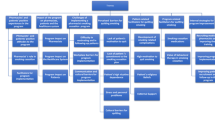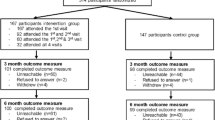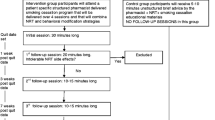Abstract
Background Smoking is a major public health problem in Qatar. The potential for community pharmacists to offer smoking cessation counseling in this country can be high. Objectives To determine the current smoking cessation practices of community pharmacists in Qatar, to examine their attitudes about tobacco use and smoking cessation, to evaluate their perceptions about performing professional roles with respect to smoking cessation and to assess their perceived barriers for smoking cessation counseling in the pharmacy setting in Qatar. Setting Community pharmacies in Qatar. Methods The objectives were addressed in a cross sectional survey of community pharmacists in Qatar from June 2010 to October 2010. A phone call was made to all community pharmacists in Qatar (318 pharmacists) inviting them to participate. Consenting pharmacists anonymously completed the survey either online or as paper using fax. Data was analyzed using Statistical Package of Social Sciences (SPSS®) Version 18. Main outcome measures Qatar community pharmacists’ smoking cessation practices, their attitudes toward tobacco use, smoking cessation and smoking cessation counseling and their perceived barriers for smoking cessation counseling. Results Over 5 months, we collected 127 surveys (40 % response rate). Only 21 % of respondents reported that they always or most of the time asked their patients if they smoke. When the patients’ smoking status was identified, advising quitting and assessing readiness to quit were always or most of the time performed by 66 and 52 % of respondents respectively. Only 15 % always or most of the time arranged follow-up with smokers and 22 % always or most of the time made smoking cessation referrals. Most respondents (>80 %) agreed that smoking could cause adverse health effects and that smoking cessation could decrease the risk of these effects. In addition, the majority (>80 %) believed that smoking cessation counseling was an important activity and was an efficient use of their time. The top two perceived barriers for smoking cessation counseling were lack of time (65 % of respondents) and lack of patients’ interest in smoking cessation (54 %). Conclusions Qatar community pharmacists have positive attitudes toward smoking cessation counseling. These attitudes need to be translated into action. Interventions should be implemented to overcome perceived barriers and to improve smoking cessation activities among pharmacists.
Similar content being viewed by others
References
Lande RG, Soreff S. Nicotine addiction (cited 17/8/2011). Available at http://emedicine.medscape.com/article/287555-overview.
The World Health Organization. The top 10 causes of death fact sheet (cited 28/8/2009). Available at http://www.who.int/mediacentre/factsheets/fs310/en/index2.html.
The World Health Organization. Smoking statistics (cited 28/8/2009). Available at http://www.wpro.who.int/media_centre/fact_sheets/fs_20020528.htm.
Hatsukami DK, Stead LF, Gupta PC. Tobacco addiction. Lancet. 2008;371(9629):2027–38.
Center for Disease Control and Prevention. Smoking and tobacco use cessation and interventions (cited 28/8/2009). Available at http://www.cdc.gov/tobacco/data_statistics/fact_sheets/cessation/quitting/index.htm.
The World Health Organization. Tobacco free initiative (cited 28/8/2009). Available at http://www.who.int/tobacco/research/economics/cessation/en/index.html.
Canadian Pharmacists Association. Joint statement on smoking cessation- tobacco the role of health professionals in smoking cessation (cited 29/8/2009). Available at http://www.pharmacists.ca/cpha-ca/assets/File/cpha-on-the-issues/PPSmokingCessation.pdf.
Hudmon KS, Prokhorov AV, Corelli RS. Tobacco cessation counseling: pharmacists’ opinions and practices. Patient Educ Couns. 2006;61(1):152–60.
Aquilino ML, Farris KB, Zillich AJ, Lowe JB. Smoking-cessation services in Iowa community pharmacies. Pharmacotherapy. 2003;23(5):666–73.
Sinclair HK, Bond CM, Stead LF. Community pharmacy personnel interventions for smoking cessation. Cochrane Database Syst Rev. 2004;(1):CD003698.
Blenkinsopp A, Anderson C, Armstrong M. Systematic review of the effectiveness of community pharmacy-based interventions to reduce risk behaviors and risk factors for coronary heart disease. J Public Health Med. 2003;25(2):144–53.
Dent LA, Harris KJ, Noonan CW. Tobacco interventions delivered by pharmacists: a summary and systematic review. Pharmacotherapy. 2007;27(7):1040–51.
Dent LA, Harris KJ, Noonan CW. Randomized trial assessing the effectiveness of a pharmacist-delivered program for smoking cessation. Ann Pharmacother. 2009;43(2):194–201.
Crealey GE, McElnay JC, Maguire TA, O’Neill C. Costs and effects associated with a community pharmacy-based smoking-cessation programme. Pharmacoeconomics. 1998;14(3):323–33.
McGhan WF, Smith MD. Pharmacoeconomic analysis of smoking cessation interventions. Am J Health Syst Pharm. 1996;53(1):45–52.
Sinclair HK, Silcock J, Bond CM, Lennox AS, Winfield AJ. The cost-effectiveness of intensive pharmaceutical intervention in assisting people to stop smoking. Int J Pharm Pract. 1999;7(2):107–12.
Tran MT, Holdford DA, Kennedy DT, Small RE. Modeling the cost-effectiveness of a smoking-cessation program in a community pharmacy practice. Pharmacotherapy. 2002;22(12):1623–31.
Pharmacy based stop smoking services: optimizing commissioning (cited 27/2/2012). Available at http://www.nhsemployers.org/Aboutus/Publications/Documents/Smoking_Cessation_Guidance_fb230709.pdf.
FIP Statement of Policy the Role of the Pharmacist in Promoting a Tobacco Free Future (cited 20/9/2009). Available at http://www.fip.org/files/fip/news/tobacco-final2.pdf.
Hudmon KS, Corelli RL. ASHP therapeutic position statement on the cessation of tobacco use. Am J Health Syst Pharm. 2009;66:291–307.
Al-Kuwari MG. Tobacco control in Qatar. Middle East J Family Med. 2008;6(6):11–3.
The World Health Organization. Country-specific tobacco control profile (cited 20/9/2009). Available at http://www.emro.who.int/emrinfo/index.asp?Ctry=qat.
Global Youth Tobacco Surveillance, 2000–2007 (cited 28/8/2009). Available at http://www.cdc.gov/mmwr/preview/mmwrhtml/ss5701a1.htm.
The World Health Organization. Mortality country fact sheet 2006 (cited 28/8/2009). Available at http://www.who.int/whosis/mort/profiles/mort_emro_qat_qatar.pdf.
Al-Hamdan N, Al-Jarallah M, Ravichandran K, Al Sayyad J, Al-Lawati J, Khazal Z, et al. The incidence of lung cancer in the Gulf Cooperation Council countries. Ann Saudi Med. 2006;26(6):433–8.
1 bn cigarettes smoked in Qatar (cited 14/10/2010). Available at http://www.thepeninsulaqatar.com/qatar/55037-1bn-cigarettes-smoked-in-qatar.html.
Ashley MJ, Victor JC, Brewster J. Pharmacists’ attitudes, role perceptions and interventions regarding smoking cessation: findings from four Canadian provinces. Chronic Dis Can. 2007;28(1–2):20–8.
Edwards D, Freeman T, Gilbert A. Pharmacists’ role in smoking cessation: an examination of current practice and barriers to service provision. Int J Pharm Pract. 2006;14(4):315–7.
Margolis JA, Meshack AF, McAlister AL, Boye-Doe H, Simpson L, Hu S. Smoking cessation activities by pharmacists in East Texas. J Am Pharm Assoc (Wash). 2002;42(3):508–9.
Meshack A, Moultry AM, Hu S, McAlister AL. Smoking cessation counseling practices of Texas pharmacists. J Community Health. 2009;34(3):231–8.
Williams DM, Newsom JF, Brock TP. An evaluation of smoking cessation-related activities by pharmacists. J Am Pharm Assoc (Wash). 2000;40(3):366–70.
Brewster JM, Ashley MJ, Laurier C, Dioso R, Victor C, Ferrence R, et al. On the front line of smoking cessation: pharmacists’ practices and self-perception. CPJ/RPC. 2005;138(3):32–8.
Meyer R, Farris KB, Zillich A, Aquilino M. Documentation of smoking status in pharmacy dispensing software. Am J Health Syst Pharm. 2004;61(1):101–2.
Anderson C. Health promotion in community pharmacy: the UK situation. Patient Educ Couns. 2000;39:285–91.
El Hajj M, Al-Nakeeb R, Al-Qudah R. Community Pharmacists in the State of Qatar: a survey of their smoking cessation knowledge and educational interests (Poster 71). In: 2011 ACCP annual meeting. Pittsburgh, PA, USA. October 16–19, 2011.
Lancaster T, Silagy C, Fowler G. Training health professionals in smoking cessation. Cochrane Database Syst Rev. 2000;3: CD000214.
Sinclair HK, Bond CM, Lennox AS, Silcock J, Winfield AJ, Donnan PT. Training pharmacists and pharmacy assistants in the stage-of change model of smoking cessation: a randomised controlled trial in Scotland. Tob Control. 1998;7(3):253–61.
Couchenour RL, Denham AZ, Simpson KN. Smoking cessation activities in South Carolina community pharmacies. J Am Pharm Assoc. 2000;40(6):828–31.
Eden M, Schafheutle EI, Hassell K. Workload pressure among recently qualified pharmacists: an exploratory study of intentions to leave the profession. Int J Pharm Pract. 2009;17(3):181–7.
Butler C, Pill R, Stott N. Qualitative study of patients’ perceptions of doctor’s advice to quit smoking: implications for opportunistic health promotion. BMJ. 1998;316(7148):1878–81.
Blumenthal DS. Barriers to the provision of smoking cessation services reported by clinicians in underserved communities. J Am Board Fam Med. 2007;20(3):272–9.
Hudmon KS, Berger BA. Pharmacy applications of the transtheoretical model in smoking cessation. Am J Health Syst Pharm. 1995;52(3):282–7.
Bock BC, Hudmon KS, Christian J, Graham AL, Bock FR. A tailored intervention to support pharmacy-based counseling for smoking cessation. Nicotine Tob Res. 2010;12(3):217–25.
El Hajj M, Kheir AN, Al-Zaidan MB, Jewesson PJ. Pharmacist characteristics, medication use perceptions and professional satisfaction: a first national survey in the state of Qatar. J Healthc Leadersh. 2011;3:9–28.
El Hajj M, Hamid Y. Community pharmacists in the State of Qatar: a survey of their interests and needs in relation to breast cancer health promotion. Int J Clin Pharm. 2010;. doi:10.1007/s11096-010-9449-y.
Acknowledgments
The authors wish to thank the pharmacists who completed and returned the questionnaire. They also would like to thank Dr. Ahmed Awaisu for his support in statistically analyzing the study results.
Funding
This publication was made possible by a grant from the Qatar National Research Fund under its Undergraduate Research Experience Program and by an undergraduate research grant from Qatar University.
Conflicts of interest
The authors of this manuscript have no conflicts of interest to declare.
Author information
Authors and Affiliations
Corresponding author
Rights and permissions
About this article
Cite this article
El Hajj, M.S., Al Nakeeb, R.R. & Al-Qudah, R.A. Smoking cessation counseling in Qatar: community pharmacists’ attitudes, role perceptions and practices. Int J Clin Pharm 34, 667–676 (2012). https://doi.org/10.1007/s11096-012-9663-x
Received:
Accepted:
Published:
Issue Date:
DOI: https://doi.org/10.1007/s11096-012-9663-x




